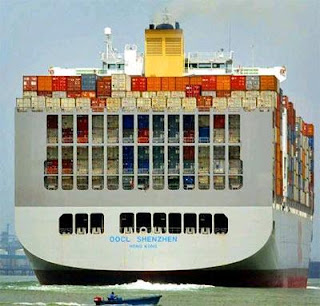Responsibilities of Multimodal Transport Operators
 The responsibilities of Multimodal Transport Operators (MTOs) are many and here are some illustrations:
The responsibilities of Multimodal Transport Operators (MTOs) are many and here are some illustrations:MTOs Liability
The MTO:
- contracts with shipper to move the cargo from one point to another,
- on a single transport documentation,
- accepts responsibility for goods in transit,
- may subcontract some or all transport tasks,
- takes over risks for the entire transport chain.
- cargo owner is entitled to claim against MTO,
- according to the agreed terms and conditions in the MT documentations,
- in practice, the owner will demand compensation from the insurer,
- insurer claims against MTO or its liability insurers.
- uniform liability - single liability; regardless of where damages occurred;
- network liability - varying limits; depending on applicable limits; for underlying modes of transport.
This liability system incorporates:
- precise rules to each transport mode
- if loss or damages can be localized
- limits of liability are applicable to the mode used
- specific reference to a particular convention must be specified in the Multimodal Transport Documents (MTD).
- Convention chaos
- Interim solution is required
- UNCTAD/ICC rules replace outdated ICC rules for MT
- New rules provide solution to MTO liability challenges
- UNCTAD/ICC rules can be with Hague Rules; Hague-Visby Rules; Hamburg Rules; Applied by reference in MTD.
- a number of definitions
- evidentary effect on MTD
- set limitations of MTO's liability
- notice period of 6 days
- time-bar is 9 months
- applicable to tort action and agents
- subject to mandatory national law
The UNCTAD/ICC Rules:
- allow both negotiable and non-negotiable MTD
- place burden to proof loss/damages to the goods on the MTO
- unless MTO can prove itself not responsible
- Hague Rules - defences: errors in navigation; management of ship; fire; limit MTO liability unless national law sets other limits.
- Main leg of MT is normally by sea
- Ocean carrier's limit are governed by the Hague Rules; Hague-Visby Rules; Hamburg Rules; and the National Law
- Ocean carrier's limits of liability are set out in the Bill of Lading.
- any party will become liable for damage needs insurance cover
- ocean carriers use P&I club membership
- MTO must also protect themselves
- the best option is to join the Truss Transport Club
- a club of container handlers
- or by insuring at reputable or exclusive insurance company.
- the MTO relies heavily on subcontractors
- management and control from a distance is complicated
- essential that MTO has adequate liability insurance
- to engage with an understanding liability insurer.
- The MTO or liability insurer must try to recover loss from liable subcontractor
- Provided it can be proven where damage took place
- Sub-carrier's liability insurer will reimburse MTO's liability insurer
- When no insurance it would be impossible to recover any losses or damages.
Insurance is a guarantee of protection if something happens. Liability insurance for MTO is to safeguard its business and customers' cargo and it also serves as an assurance to customers of MTO's credibility and trustworthiness.
MTO/Customer Relationship
MTO needs liability insurance for its own security and the security of its customers as well. The insurance consist of varying modal limits which are also based on different conventions and local rules and regulations.
The challenges are the applications for such insurance are often a nightmare for MTOs. Liability covers with a liability insurer.
Recourse Action
Localized Loss or Damage:
- often uncertain MTO can recover from sub-carriers
- particularly in cases between different transport modes
- with non-localized loss/damage liability rests with MTO alone
- Localized damage: possible to determine where loss or damage occurred
- Non-localized damage: Not possible to determine were loss or damage occurred
